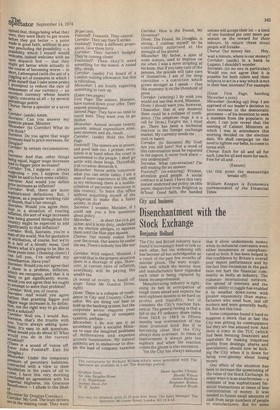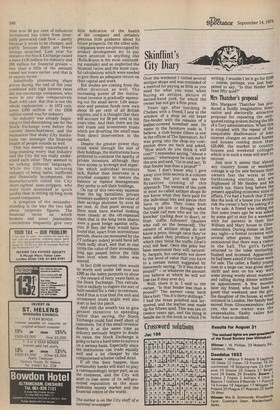City and business
Disenchantment with the Stock Exchange
Benjamin Holland
The City and British industry have found it increasingly hard to talk to each other, but the widening rift has become all but unbridgeable as a result of the past few months of suicidal gloom. The wary scepticism with which the money men and manufacturers have regarded each other is being replaced by blank incomprehension. Manufacturing industry is tightening its belt in anticipation of tough times ahead and expects the next eighteen months to be hard on profits and liquidity, but it considers the City's reaction hysterical. The general feeling is that a fall in the FT ordinary share index from 543.6 to 199.8 in fifteen months was overreaction of the most irrational kind. But it is becoming clear that the City always does overreact. At times of improvement it always gets too euphoric and when the reaction comes the gloom is also excessive. Yet the City has always assumed that it alone understands money while its industrial customers were either innumerate or unsophisticated or both. It has been helped in this confidence by Britain's overall poor export performance and by the fact that recessions in the past have not hurt the financial community as badly as industry. The elaborate international network, the spread of interests and the nimble ability to juggle has enabled it to weather down-turns with greater equanimity than manufacturers who went bust, laid off workers and were generally badly hit. But not this time.
Some companies found it hard to suppress a smirk that at last the City was getting its comeuppance but they are less amused now. And there is irony in the TUC (which had been berating financiers and capitalists for making iniquitous profits from dealings, shares and speculation), should now be kicking the City when it is down for being over-gloomy about losing money.
One effect of the situation has been to increase the questioning of the value of the Stock Exchange. In many ways it is an anachronism — a remnant of less sophisticated financial transactions at times of less concentration of money. It was needed to funnel small amounts of .cash from large numbers of people to manufacturers. But for some
time now 60 per cent of industrial investment has come from internally generated cash flow — partly because it tends to be cheaper, and partly because there are fewer strings attached. Last year for instance the Stock Exchange raised a mere £135 million for industry and £86 million for financial groups — less than a fifth of the amount raised ten years earlier, and that is in money terms.
Admittedly plummeting share prices during the end of the year combined with high interest rates did not encourage companies, who were in any case comparatively flush with cash. But that is not the whole explanation — in 1972 only some £300 million of the £956 million raised was for industry.
So industry was already beginning to find diminishing use for the Stock Exchange even before the current disenchantment, and the realisation that shaky City institutions can endanger the financial health of people outside as well.
This has merely exacerbated a long-standing worry that industry and the City did not really understand each other. They seemed to be talking different languages. While the City was accusing industry of being naiVe, inefficent and financially incompetent, the manufacturers called the City short-sighted asset-strippers who were more interested in quick profits than in setting up long-term sound companies.
A symptom of the misunderstanding is the way the two talk about corporate figures. The financial ratios on which brokers and some journalists concentrate frequently give very little indication of the health of the company and certainly precious little guidance about its future prospects. On the other side, companies were too preoccupied by product development etc to pay much attention to anything else (Rolls-Royce is the most outstanding example) and so neglected the financial ratios and the more careful calculations which were needed to give them an adequate return on their capital and work.
But doubts are coming from the other direction as well. The increasing power of the institutional investor is gradually squeezing out the small saver. Life assurance and pension funds now own about 30 per cent of all British equities, and it is thought that they will account for 50 per cent in ten years time. And then there are the unit trusts and investment trusts which are diverting the small man from direct intervention in the market.
Despite the greater power they could wield through the size of their holdings, the institutions have preferred to continue the apathy of private investors, although they have access to leverage and expertise which individual investors lack. Rather than intervene in a troubled company to restore the balance or replace management they prefer to sell their holdings.
On top of this two-way squeeze from the big battalions, private investors suddenly saw the value of their savings plummet by over 60 per cent. At that point several of them must have started looking more closely at the oft-repeated claim that in the long term shares were a good hedge against inflation. If they did they would have found that, apart from intermittent periods, shares (as measured by the FT ordinary index). would have left them sadly short, and that in real terms the value of their investment long ago passed below the 1935 base level when the index was started.
In fact MOO invested then would be worth well under £40 now not £200 as the index purports to show — the reward of forty years faith in the Stock Exchange. This calculation is unlikely to inspire the sort of faith needed-for a risky investment. And if that is true then the unit and investment trusts might well also start to feel the pinch.
And with the wealth tax to give greater incentive to spending rather than saving, the Stock Exchange could find itself short of customers. Yet if the small investor deserts it at the same time as industry seriously begins to doubt its value, the Stock Exchange is going to have a hard time to survive on a serious basis. Especially since the institutions can trade equally well and a lot cheaper by the computerised scheme called Ariel.
If all this does happen, then presumably banks will start to play a correspondingly larger part, as on the continent, and the City will start to lose some of its self-promoted reputation as the most elaborate money market and the financial centre of the World.
The author is on the City staff of a national newspaper



































































 Previous page
Previous page